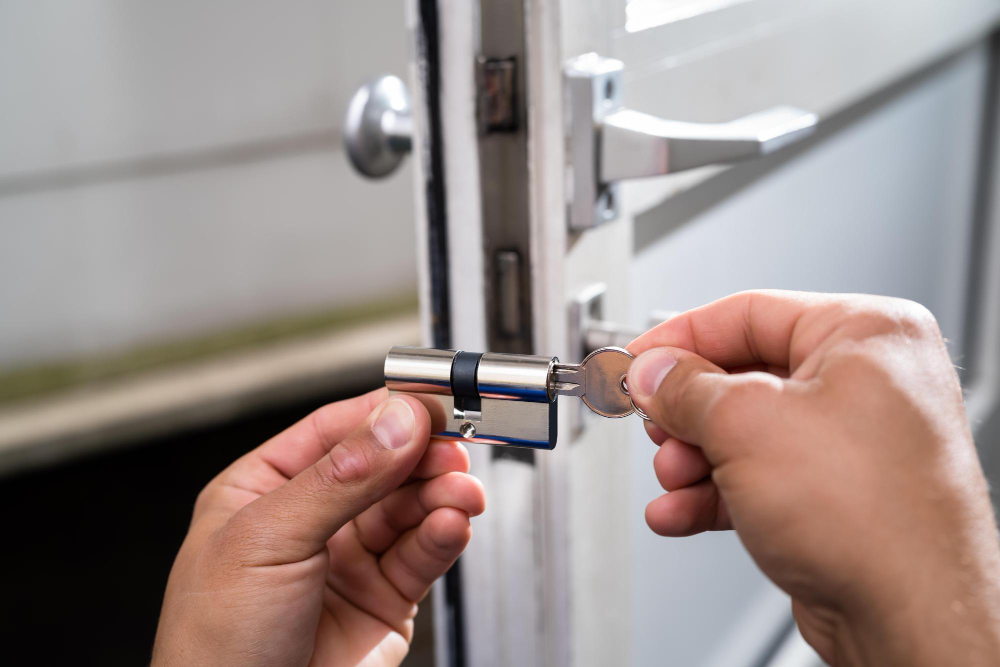If you are looking to make another key, there is a high chance you need a spare one. Being in this situation, you may wonder about the locksmith’s ability to make keys without the actual key. So, can locksmiths make keys from a lock?
We’ll explore the fascinating techniques and skills that professional locksmiths employ to create keys, even when all you have is the lock itself. We’ll dive into the methods locksmiths use to decipher the intricate internal workings of various lock types.

Can Locksmiths Make Keys from a Lock?
Skilled locksmiths possess the ability to create keys using only the lock itself. This process requires expertise, specialized tools, and a deep understanding of lock mechanisms. Let’s explore the step-by-step methods locksmiths employ to accomplish this task.
Lock Disassembly
The Initial Step
The first stage in creating a key from a lock involves carefully disassembling the lock. Locksmiths begin by removing the lock cylinder from its housing. This step requires precision to avoid damaging the lock components.
Once the cylinder is removed, the locksmith examines the internal parts. They pay close attention to the pin configuration, which is crucial for determining the key’s shape. Accurate documentation of these details ensures the newly crafted key will function smoothly.
Tools of the Trade
Locksmiths use a variety of specialized tools for lock disassembly. These may include cylinder removal tools, pin kits, and tweezers. A plug follower is often employed to keep the pins in place during disassembly.
Other essential tools include lock picks and tension wrenches. These help the locksmith understand the lock’s internal structure without causing damage.
Impressioning Technique
The Art of Impressioning
Impressioning is a skilled technique used to create a working key from a lock. It involves inserting a blank key into the lock and manipulating it to leave marks. These marks indicate where material needs to be removed to create a functional key.
This method requires patience and a keen eye for detail. The locksmith must interpret the subtle marks left on the key blank accurately.
Executing the Technique
The locksmith inserts the blank key and applies slight pressure while turning it. This action causes the lock pins to leave tiny indentations on the key. The process is repeated multiple times to ensure all pin positions are marked.
After each attempt, the locksmith files down the marked areas. They continue this process of inserting, marking, and filing until the key turns smoothly in the lock.
Code Cutting
Understanding Code Cutting
Code cutting is a method of key creation that relies on the lock’s specific numerical code. Each lock has a unique code that corresponds to the depths and spacing of its key cuts. Locksmiths can determine this code through various means.
Once the locksmith cracks the code, they can use it to create a new key with precision. This method is often faster and more accurate than impressioning. For this technique, locksmiths use specialized machines to translate the code into exact key cuts, ensuring a perfect fit for the lock.
Implementing Code Cutting
To use code cutting, locksmiths first need to identify the lock’s code. This can be done by examining the lock’s components or using a codebook that matches lock brands with their corresponding codes. In some cases, the code may be stamped directly on the lock or provided by the manufacturer.
With the code in hand, the locksmith uses a key cutting machine programmed with the correct specifications. The machine cuts the key blank according to the code, creating an exact match for the lock. This process is highly precise and can often produce a working key on the first attempt, saving time and resources.
Why Make Keys Instead of Replacing The Lock?
Making keys instead of replacing locks offers several advantages. First, it’s a convenient solution that saves time and interrupts the customer’s routine as little as possible. Another major advantage is cost efficiency, as the material and labor costs are lower compared to replacing the entire lock mechanism.
Overall, making new keys helps maintain familiarity with existing locks. This preserves locking systems and allows for quick and cost-effective solutions to many lock-related problems.
Limitations and Challenges
While locksmiths can create keys for many locks, certain limitations and challenges exist. High-security locks often use patented key systems or restricted keyways, preventing unauthorized duplication. In many cases, manufacturers or authorized dealers are the only ones who can provide new access credentials or keys for advanced locking systems.
This ensures increased security. However, it restricts the alternatives for key creation. These complex systems frequently require software updates to retain their security characteristics. Compatibility concerns may also develop when combining new technologies with outdated locking systems.
Potential Challenges Locksmiths Face
Locksmiths face several challenges, including dealing with damaged locks and uncommon lock types. Locksmiths encounter high-security locks, electronic locks, and antique locks, each presenting unique difficulties.
These challenges require locksmiths to continually update their skills. They must also keep their knowledge current to effectively manage various lock types. Ensuring security and accessibility for clients is essential. Continuous learning and adaptation are essential for locksmiths to stay proficient in their trade.

Conclusion
Locksmiths face various challenges, from dealing with damaged locks to handling uncommon lock types. But can locksmiths make keys from a lock? The answer is yes, and it showcases their expertise in addressing complex security needs.
Whether it’s assessing a damaged lock or working with high-security, electronic, or antique locks, locksmiths must continually update their skills. If you are stuck with a lock without key, this article may help you understand better if a locksmith could offer a potential solution.


